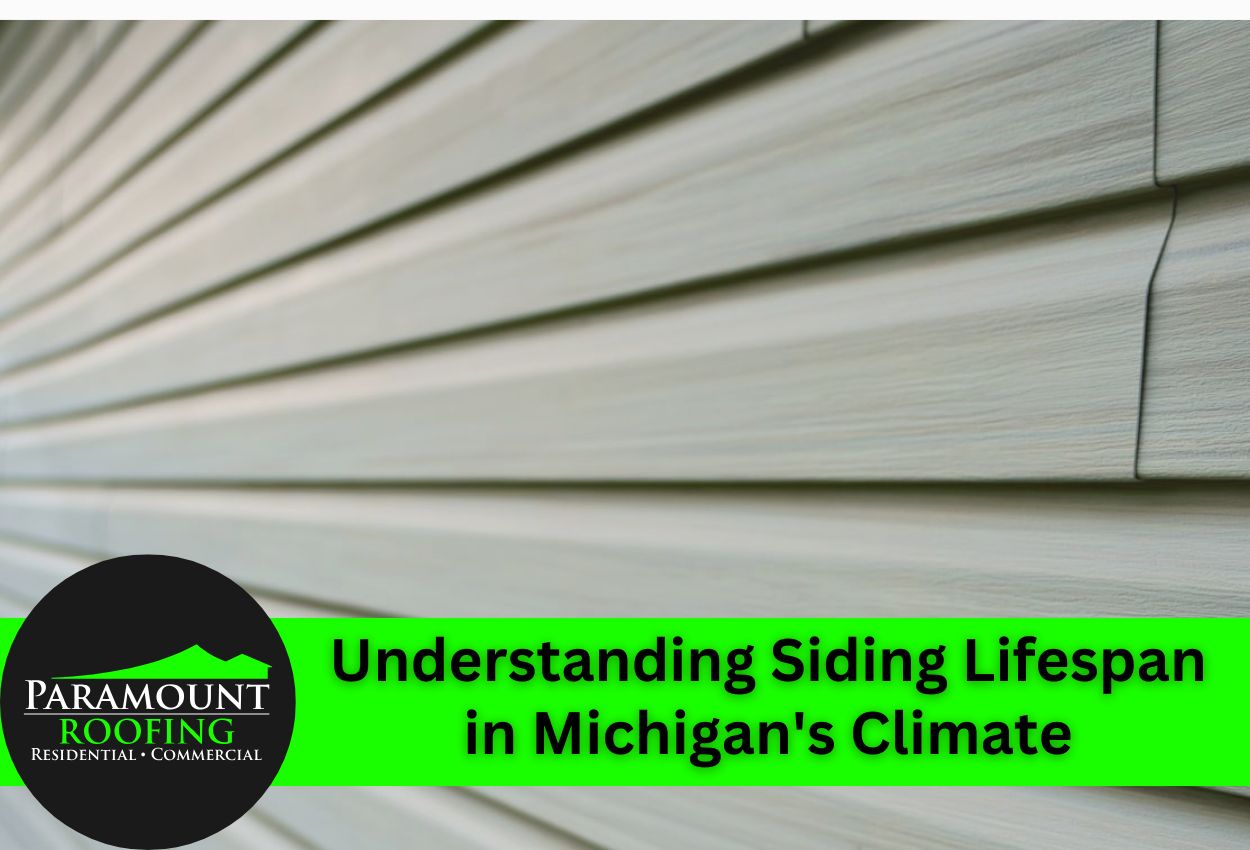Michigan homeowners often face difficulties when it comes to protecting their homes from the elements. The state’s distinct four-season climate can test exterior materials, particularly siding. With freezing winters, humid summers, and everything in between, knowing how long siding lasts in Michigan is crucial for making smart home improvement decisions.
Different siding materials respond differently to Michigan’s weather patterns. Vinyl siding, a popular choice among Detroit-area residents, typically lasts 20 to 40 years, but this range can vary based on material quality and exposure to elements. Fiber-cement siding offers extended durability, often reaching over 50 years, no matter the weather conditions, while wood siding might require replacement after just 15 to 30 years in Michigan’s moisture-heavy environment.
Location within the state also plays a significant role in siding performance. Northern Michigan properties face harsher winter conditions with heavier snow and colder temperatures, potentially reducing siding lifespan. Meanwhile, homes in the southern regions, including the Detroit metropolitan area, may experience less extreme cold but more freeze-thaw cycles that can stress siding materials over time.
Understanding these differences in regional weather conditions helps homeowners decide which siding material is best for their specific location, budget, and expectations for long-term performance.
Vinyl Siding Performance in Michigan: Expectancy and Considerations
Vinyl siding remains the most popular choice for Michigan homes, typically lasting 20 to 40 years when correctly installed and regularly maintained. The material’s performance in our state’s climate depends largely on how it handles the extreme temperature fluctuations. Vinyl siding expands and contracts during Michigan’s freeze-thaw cycles, which can lead to warping or buckling if not installed with appropriate expansion gaps.
Regular maintenance significantly extends vinyl siding’s lifespan in Michigan homes. Simple tasks like seasonal cleaning to remove mildew and dirt, prompt repair of any damaged sections, and keeping trees trimmed away from the house can add years to your siding’s functional life. Signs that your vinyl siding is nearing the end of its lifespan include fading color, cracks, warping, and water infiltration.
Premium vinyl siding options offer enhanced benefits for Michigan homeowners. These higher-grade products typically feature thicker panels (up to 0.055 inches vs. the standard 0.040 inches), improved impact resistance for hail protection, and advanced UV inhibitors that prevent color fading from our summer sun. Insulated vinyl siding with foam backing provides additional energy efficiency during harsh Michigan winters while offering superior rigidity that stands up better to high winds common along the Great Lakes.
Fiber-Cement Siding: Superior Durability for Michigan Homes
Fiber-cement siding is an exceptional option for Michigan homeowners seeking long-term durability. With a potential lifespan exceeding 50 years, this robust material easily withstands Michigan’s harsh seasonal transitions. Unlike other materials, fiber cement doesn’t expand or contract significantly during freeze-thaw cycles, preventing the buckling and warping common with alternatives. This dimensional stability is even more valuable in regions like Detroit, where winter temperatures regularly fluctuate around freezing.
The material’s composition, a blend of cement, sand, and cellulose fibers, creates exceptional resistance to moisture, a significant advantage in Michigan’s humid summers and wet springs. While the initial investment is higher than vinyl options, the extended lifespan typically delivers better long-term value for Michigan homeowners. The material also resists fire, insects, and impact damage from hailstorms that occasionally strike the region.
To maximize your fiber-cement siding’s lifespan, annual inspections should focus on caulking around joints and attachments, especially after severe weather. Professional cleaning every few years removes accumulated dirt and prevents moisture retention against the siding. By following these maintenance protocols, Michigan homeowners can enjoy decades of protection and curb appeal from their fiber-cement siding investment, even through the harshest weather conditions the Great Lakes region delivers.
How Wood and Engineered Wood Siding Lasts in Michigan
Traditional wood siding typically lasts between 15 to 30 years in Michigan’s climate, with performance heavily dependent on maintenance routines and wood species. Cedar and redwood naturally resist rot and insects better than pine or spruce options, making them more suitable for our state’s humid conditions. Michigan’s freeze-thaw cycles and heavy precipitation create significant challenges for wood siding, as moisture accelerates deterioration if not properly addressed.
Engineered wood products offer improved performance, lasting 20 to 30 years with less maintenance than traditional wood. These composite materials combine wood fibers with resins and waxes to enhance moisture resistance, an important feature for Michigan homes. Products with factory-applied finishes typically perform better in our state’s challenging environment, resisting the warping and splitting that often affects traditional wood during seasonal transitions.
Maintenance is non-negotiable for wood siding in Michigan. Homeowners must regularly inspect, clean, and stain or paint every three to five years, and immediately repair any damaged sections. Extra attention should be paid to north-facing walls that receive less sunlight and stay damp longer. Proper flashing installation around windows, doors, and rooflines prevents water intrusion that can significantly shorten wood siding’s lifespan. Professional inspection can identify early signs of moisture damage before they lead to structural issues that require complete replacement.
Metal and Aluminum Siding Durability in Detroit and Beyond
Metal siding options deliver exceptional longevity for Michigan homes, with potential lifespans exceeding 40 years when properly installed and maintained. In urban environments like Detroit, these materials demonstrate remarkable resilience against industrial pollution and road salt exposure, elements that can quickly deteriorate other siding options. Quality metal siding maintains its structural integrity through extreme temperature swings, from subzero winter days to humid 90-degree summers, without warping or buckling.
Aluminum siding deserves special consideration for properties in Michigan’s abundant lakefront and high-humidity areas. Its natural corrosion resistance makes it a great choice for homes near the Great Lakes, where persistent moisture can accelerate siding damage. Unlike steel which may rust over time, aluminum naturally forms a protective oxide layer that prevents deterioration even after decades of exposure to Michigan’s climate extremes.
Both metal options require minimal maintenance compared to other siding materials. Periodic cleaning to remove accumulated salt and environmental debris, along with inspection of fasteners and seams after severe weather, generally suffices to maintain peak performance. For Metro Detroit homeowners seeking decades of worry-free protection, metal siding is a premium solution that withstands Michigan’s challenging weather patterns while needing minimal intervention throughout its life.
Warning Signs Your Michigan Home Needs Siding Replacement
Michigan’s climate has specific wear patterns that signal when siding has reached the end of its functional life. Visible warping or buckling indicates moisture has compromised your siding’s integrity, which is common after our severe freeze-thaw cycles. Watch for sections that appear wavy or distorted, especially after winter, when ice dams may have forced water behind the siding.
Fading can be more than a cosmetic concern. Severely faded siding has lost its protective properties against UV radiation and moisture. For Michigan homes, this degradation happens more quickly on south and west-facing walls that receive maximum sun exposure. Cracks, chips, or holes, even small ones, provide entry points for moisture that can cause extensive damage during Michigan’s wet springs.
Timing your siding replacement strategically around Michigan’s seasonal patterns improves installation quality and longevity. Late spring through early fall typically provides the optimal weather window, with moderate temperatures allowing proper adhesive curing and material acclimation. Scheduling replacement before winter arrives prevents existing siding issues from worsening during harsh weather months.
Many Detroit-area homeowners coordinate siding replacement with other exterior projects like roofing or window installation to maximize efficiency and ensure proper integration of all exterior systems. This comprehensive approach provides the most effective protection against Michigan’s challenging climate while potentially reducing overall project costs.
Maximizing Your Siding’s Lifespan: Michigan-Specific Maintenance Tips
Michigan’s extreme seasonal changes need specialized maintenance strategies to extend your siding’s functional life. In winter, carefully remove snow from siding using plastic brushes or brooms rather than metal tools that can scratch or damage surfaces. Keep snow away from the roof edge to prevent moisture absorption and ice dams that can damage siding. These formations are particularly problematic around the Detroit metro area, where winter thaws and refreezes are common.
Spring inspections are crucial after winter weather. Check for loose panels, cracks at seams, and signs of moisture infiltration. Pay special attention to north-facing walls that receive less sunlight and dry more slowly. Michigan’s humid summers require periodic cleaning to prevent mold and mildew growth, specifically on siding near shrubs or in shaded areas.
Professional treatments can extend your siding’s durability in our harsh climate. Waterproof sealants designed specifically for Michigan’s temperature extremes provide additional protection at seams and transitions. Proper moisture barrier installation behind siding is an essential defense against water intrusion during heavy precipitation. For maximum protection, ensure adequate insulation to prevent condensation from forming between your home’s exterior walls and siding panels.
Scheduling professional inspections every two years means issues are found before they compromise your siding’s integrity, saving thousands in potential repairs and extending your siding’s serviceable life in Michigan.
Protect Your Home with Durable Siding from Paramount Roofing
Ensuring your home’s exterior can withstand Michigan’s challenging climate is crucial. At Paramount Roofing, we understand the importance of durable, long-lasting siding. Whether you’re considering vinyl, fiber cement, or metal siding, knowing how long your siding will last in Michigan’s unique weather conditions is key to making a final decision. Don’t wait for visible damage to dictate your home maintenance decisions. Routine inspections and maintenance can prolong the life of your siding, saving you money and improving your home’s safety and curb appeal.
Ready to discuss your siding options or need expert advice on maintaining your existing siding? Call Paramount Roofing today at (586) 690-0227 and ensure your home stands strong against Michigan’s weather year after year.
 Free Estimate
Free Estimate
 Request Service
Request Service Locations
Locations 
